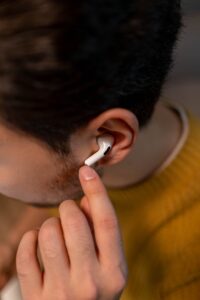Five Methods to Keep Your Ears Safe
How can we safeguard our hearing?
Five Methods to Keep Your Ears Safe: Noisy activities, such as those in factories, mines, or industries, used to be the most common source of hearing difficulties. Still, health and safety rules have helped to make these occupations less hazardous.
Nowadays, what we do in our spare time puts our hearing at risk. Attending concerts or listening to music loudly, indoors or outdoors, may cause long-term damage.
If you have ringing in your ears or dull hearing after listening to the noise, the NHS says you've listened to it too loudly or for too long and offers a simple rule of thumb: “If you can't communicate to someone two feet away without shouting, the noise level could be dangerous.”
Here are five hearing-protection tips.
Guidelines for Keeping Your Ears Healthy
1. Put on hearing protection.
Earplugs or earmuffs can minimise the amount of noise you are exposed to and the volume when listening to live music without interfering with your enjoyment. They're essential while dealing with noisy tools like a drill or electric saw and also excellent for shows.
2. Put on headphones
Noise-cancelling headphones, often muff headphones, are more effective than in-ear headphones at blocking background noise. This implies that you can listen to music on your phone or music player at a reduced volume. You should, however, take regular breaks to rest your ears.
3. Use the 60:60 rule
The NHS suggests listening to music on your phone at 60% of maximum volume for no more than 60% of the day. Check the volume dial on your device to see if you're listening at an unsafely high volume.
4. lower the loudness
Never raise the level to drown out background sounds. The level is too high if the music is uncomfortable or you can't hear other sounds when using headphones.
5. Allow your ears to rest.
According to Action on Hearing Loss, your ears need at least 16 hours of recovery after being exposed to 100 decibels of loud music for around two hours, such as in a club. According to the charity, it is never too early to start caring for your hearing.
Discover these helpful ear care techniques, which range from cleaning to sunscreen.
Your ears perform numerous functions for you, including sound transmission, balance maintenance, self-cleaning, and growth. They have the smallest bones in your body but are in charge of so much. Learn how to care for your ears with these techniques to keep them healthy:
Don't put anything in your ears.
Clean your ears thoroughly.
Maintain regular appointments with your audiologist.
When you are outside, apply sunblock to your ears.
In noisy surroundings, wear hearing protection.
When flying, take extra measures.
Maintain the cleanliness and dryness of your hearing aids.
Continue reading for more information on these ear care suggestions.
Put nothing in your ears.
Don't stick anything small in your ear, not even cotton swabs for cleaning. Small items like these can cause ear canal injuries, infections, and even rupture of the eardrum. Cotton swabs can also push earwax deeper into the ear canal. See our next ear care suggestion for how to clean your ears.
Safely clean your ears.
To clean your ears safely, gently wash your pinna with a warm washcloth. Because your ears have a built-in self-cleaning mechanism, they rarely need to be cleaned from the inside. However, if earwax has accumulated or your ears feel clogged or uncomfortable, consult your doctor or audiologist for a safe approach to eliminate the obstruction.
Maintain regular appointments with your audiologist.
Regular visits to an ear doctor, such as an audiologist, are the best method to ensure that everything is in working order. They can assess your hearing and tailor recommendations to maintain your ears healthily.
Some doctors can perform a hearing test as part of your annual physical, so you may not need to see a specialist in some circumstances. If you experience symptoms of hearing loss, tinnitus, or clogged ears, you should see an audiologist who specialises in ear health.
Brought To You By Ear Wax Removal Harrow
The post Five Methods to Keep Your Ears Safe appeared first on https://gqcentral.co.uk




